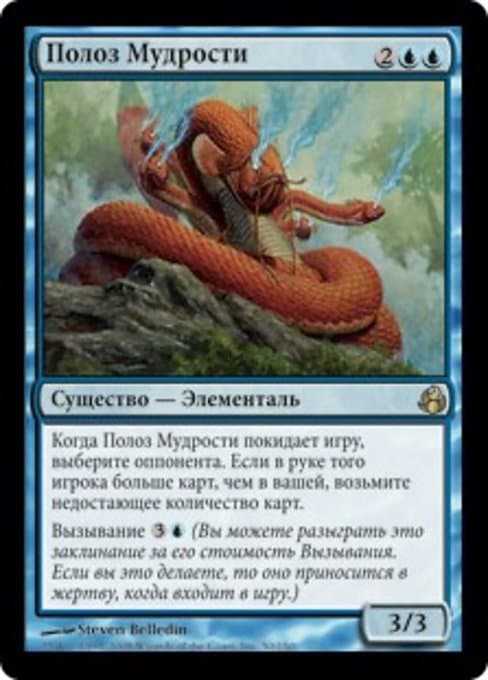
Полоз Мудрости
Существо — Элементаль
Когда Полоз Мудрости покидает игру, выберите оппонента. Если в руке того игрока больше карт, чем в вашей, возьмите недостающее количество карт. Вызывание (Вы можете разыграть это заклинание за его стоимость Вызывания. Если вы это делаете, то оно приносится в жертву, когда входит в игру.)
3 / 3
Illustrated by Steven Belledin
· Morningtide (MOR)
Slithermuse
#50 · Rare · Russian · Nonfoil/Foil
Legal Formats
| Standard |
| Pioneer |
| Modern |
| Legacy |
| Vintage |
| Commander |
| Oathbreaker |
| Alchemy |
| Explorer |
| Historic |
| Timeless |
| Brawl |
| Pauper |
| Penny |
Variants
Under Construction
Prints
Rulings
2008-04-01 : Effects that cause you to pay more or less to cast a spell will cause you to pay that much more or less while casting it for its evoke cost, too. That’s because they affect the total cost of the spell, not its mana cost.
2008-04-01 : Evoke doesn’t change the timing of when you can cast the creature that has it. If you could cast that creature spell only when you could cast a sorcery, the same is true for cast it with evoke.
2008-04-01 : If a creature spell cast with evoke changes controllers before it enters the battlefield, it will still be sacrificed when it enters the battlefield. Similarly, if a creature cast with evoke changes controllers after it enters the battlefield but before its sacrifice ability resolves, it will still be sacrificed. In both cases, the controller of the creature at the time it left the battlefield will control its leaves-the-battlefield ability.
2008-04-01 : If you’re casting a spell “without paying its mana cost,” you can’t use its evoke ability.
2008-04-01 : When you cast a spell by paying its evoke cost, its mana cost doesn’t change. You just pay the evoke cost instead.
2008-04-01 : Whether evoke’s sacrifice ability triggers when the creature enters the battlefield depends on whether the spell’s controller chose to pay the evoke cost, not whether they actually paid it (if it was reduced or otherwise altered by another ability, for example).
2008-04-01 : You choose an opponent when the ability resolves. Once you determine how many more cards than you that player has, that number is locked in as the amount you’ll draw.
Comments
Under Construction